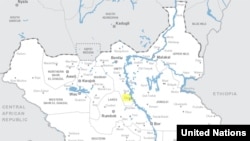Twenty-three-year-old Elizabeth Nyalat and her young child live with Nyalat’s mother in this small village in Unity state.
Nyalat is from Yei, 360 miles south of Ganyiel. She came to Ganyiel on December 10, 2013 for a visit and was unable to go back home. “On the 15th [of December], the crisis happened in Juba,” she said.
Nyalat is among tens of thousands of South Sudanese who have been living hand-to-mouth in Ganyiel and surrounding Panyijar county since the fighting started 15 months ago. Thousands of internally displaced persons (IDPs) have flocked to the region in southern Unity state since the fighting began. Some people have sought shelter in the midst of the nearby Sudd wetlands, while others live in the open or with relatives in Panyijar county.
Like many of the IDPs, Nyalat survives on food rations she gets from the World Food Program (WFP). She and her family get four kilograms, or just under nine pounds, of food per person per month from the U.N. agency.
Nyalat uses up her rations in just two weeks. For the rest of the month, she gets by on the extra food she buys using the money her mother earns as a cook for one of the aid agencies in Ganyiel.
“Here is very tough," Nyalat said. "At least if World Food [Program] comes, it is better.”
Nyalat is one of an estimated 3 million South Sudanese whom aid agencies are trying to reach with emergency food aid. Humanitarian agencies and the United Nations have been warning since last year that mass displacement, insecurity and the disruption to farming that have all been caused by the fighting could result in famine in South Sudan.
Disappointment
Nyalat has followed the peace talks between President Salva Kiir and rebel leader Riek Machar since they began 14 months ago. She says every time the two men have met, she allowed her hopes to rise that they would sign an agreement to end the fighting and let people like her go home. Kiir and Machar have held face-to-face talks at least four times since the conflict began. Nyalat's hopes for peace have been dashed every time.
Elizabeth Nyamet gets 28 kilograms of food rations each month for her seven family members. She says people in Ganyiel are hurting as attempts to end the conflict drag on.
“Everything is very expensive. Our life is not good, really. For me, I don’t know the peace will come... I am very tired. We are suffering for the war; we don’t know when peace will come,” she said.
Lost generation
WFP Executive Director Ertharin Cousin warned during a visit to South Sudan last week that an entire generation of South Sudanese could be lost to violence and hunger if the fighting does not stop soon.
WFP spokesman for South Sudan, George Fominyen, says the U.N. agency is racing to preposition 100,000 metric tons of food around South Sudan ahead of the rainy season, which usually starts in April — less than a week away. Much of the emergency food is having to be airlifted, which is one of the most costly ways to deliver relief supplies. But aid agencies have little choice: insecurity is widespread in South Sudan, and, once the rainy season arrives, many of the country's roads will become impassable.
Nyamet says, in spite of their best efforts, the aid agencies are falling short.
“We are affected by hunger, shortage of drugs, disease outbreaks, even water [shortages]. Waiting for food is not easy. Maybe we spend almost three months without getting food," she says.
When the rations run out, Nyamet says she and other women go down to the river and collect water lilies to feed their families. Then, they wait for the next delivery of WFP food to arrive and dare to hope for peace.







